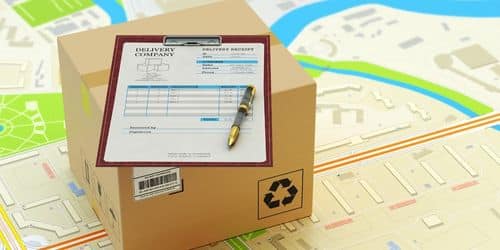If you’ve ever sent anything, you’ve probably seen the term FOB written somewhere in the paperwork associated with the shipment. But, how many people understand what it means? As it turns out, not very much at all. Read on to learn more about FOB shipping and how to replace the FOB key.
What is FOB?
The shipping phrase “Free on Board” (FOB) indicates the stage in the logistics process at which the seller or buyer assumes responsibility for the shipment’s condition. These terms are written into the sales contract between the seller and the buyer. These terms also determine who owns the item, who is responsible for it, and who pays for shipping.
In addition, the terms are part of the deal between the seller and the buyer. They are written on the purchase order. The purchase contract or other deal between the seller and the buyer will say who owns what. FOB status only shows who is responsible for the shipment from the beginning to the end. So, understanding the “free on board provision” will help suppliers and buyers ship goods smoothly. These terms can also affect the cost of storing goods, shipping them, and insuring them, no matter if the transfer is local or international.
How Does a Fob Work?
When items are shipped from the seller’s location, the sale is complete as soon as the delivery leaves the seller’s facility. Delivery costs are the responsibility of the customer, who also takes title to the product while it is in transit.
So, the buyer, not the vendor, is responsible for filing any assertions for restitution if a metal box is lost or destroyed in transit.
Why Does Fob Matter?
In the event of damaged goods, FOB is available to help shippers and carriers. The primary ones are the protection of the counterparties and clarity as to who is responsible for what once the items have been sent. Most landing terminals may not accept damaged cargo. They refuse to take it with a note indicating damage in case they need to file a complaint against the carrier later. However, if FOB Origin is specified, the onus of shipment liability shifts to the buyer. He would be the one who refuses to take possession of what is rightfully his. It is also the buyer’s responsibility to assume any risks. However, the seller is under no obligation to take back the merchandise.
What Does Fob and CIF Mean?
Cost, insurance, and freight (CIF) and “free on board” (FOB) are two commonly used shipping terms. Here, international trade entails the movement of products from one location to another, and these terms are used in connection with the transportation of goods by sea. The same rules apply to domestic and international shipments sent by air.
Fob Key
The term “fob key” refers to a key chain or other devices. People think that the word “fob” was made up to describe a watch from the early 1900s. However, it first came out in 1888 as it is the decorative element that accompanies a pocket watch.
In addition, a fob key is a small remote control that can be used for many things, such as opening garage doors, starting cars, and getting into hotel rooms without a key. It is a small electronic device that can be carried around and used to open doors, trunks, and other secure places. The word can also be used to describe the small trinkets that people keep with their keys to make them look nicer. The doors of a car can also be locked and unlocked with this handheld device.
How Can You Replace Key Fob?
Most modern automobiles feature a fob key entry system that does not require the use of a physical key to unlock the door. A few people can turn the key to start a car. But what if you lose or break that device? “If your car was made in the last five years, a new-car dealer is probably your best bet if you need a new key fob,” says CR’s head engineer John Ibbotson. “Programming equipment is expensive, so a new-car dealer is probably your best bet.” Certain replacement key fobs purchased from Audi and Subaru dealerships may not work properly. Also, even if the vendor is in charge of everything, costs can be kept low.
In addition, if you need to make a quick trip, contacting a dealer is easy. Most dealerships require 15-30 minutes to replace the key fob programming, which includes cutting the mechanical backup key. According to Yu, most key fobs that may be replaced by the user necessitate the use of two operational keys in order to program a third key without visiting the dealer.
Also see: The Best Key FOB Systems for Business in 2023& Reviews
Fob Shipping
“Free on Board” (FOB) is a commonly used industry term in international shipping. It’s the most effective strategy for keeping transportation costs down. Despite the proliferation of contract requirements, “free on board” trade arrangements dominate the UK market for shipping Asian commodities.
Furthermore, the vendor pays all fees until the items are loaded aboard a ship at the agreed-upon port when shipping this device. The buyer pays all shipping fees and risks once a consignment is on a ship. The seller and buyer equally share “FOB” shipping costs, hazards, and obligations. FOB means that the seller pays for shipping if the goods are put in a container at the seller’s port. Also, FOB Shanghai suppliers are responsible for the goods until they are put on the ship.
Fob shipping terms
From the time the products leave the country of origin and are put on a ship (or plane) to the time they arrive at your door in the UK. You are in charge of paying for everything.. After the products are on the ship, you are also responsible for the transportation costs. The term “seaport” appears frequently in the following vocabulary. This port is where the goods will be sent. “FOB Shanghai” means the supplier expects the client to send products to the UK. Also, transportation costs and export authorization may make the seller’s port inconvenient.
So, if you’re buying this device on its shipping terms. Then, the seller’s obligations will go much beyond merely getting the item to the dock. As this is a persistent problem, we felt it was necessary to elaborate. On these FOB shipping terms, your supplier will pay for everything necessary to load the items onto the yacht, until the goods are delivered to the address you provide. Here are some of the things your supplier must cover:
- Transport costs
- License fees
- Terminal handling charge
- Document fees etc
Is Insurance Required for Fob Shipments?
To be clear, neither the buyer nor the seller is required to get shipping insurance, though doing so is generally recommended. It is normal for the buyer to pay for the insurance, however, this can be negotiable when the both parties seal the deal.
What Is CIF?
CIF is usually used when shipping large or bulky items by sea. The obligation for putting the shipment aboard the vessel is with the vendor. The seller is responsible for paying shipping and insurance costs. The vendor also organizes any obligatory inspections, permits, and paperwork.
Under a CIF arrangement, the buyer is fully accountable for the products after they arrive at the delivery point. It’s up to the buyer to pay any additional taxes, such as customs duties, once the shipment reaches its end destination port. After receiving payment, the transport company hands the customer the goods’ transfer paperwork.
In addition, purchasing products via CIF is a costly alternative. This is because the seller can pick the shipping company, and the consumer may end up paying extra because the seller used their preferred company. If the buyer must rely on the seller’s agents for all communication, that could be an issue. The buyer may have to pay extra fees at the port, such as docking fees and customs clearance fees before the items can be released from customs.
Fob vs CIF
Even they are quite similar, however they differ in various ways, which include:
Firstly, where CIF and FOB differ most is in who is responsible for the products while they are in transit. The vendor pays for and takes on the risk of transportation up until the point of delivery, at which point the buyer takes over. However, under a FOB agreement, the buyer is responsible for all risks and costs once the shipment has been put on the cargo ship.
Secondly, there are benefits and cons to each type of agreement. Even though free-on-board is usually what sellers want and cost-inclusive (CIF) is usually what buyers want, there are times when one method is better for both.
Thirdly, most buyers think that FOB agreements are more affordable and better. For one, customers can pick their shippers and set their insurance limitations. In contrast, CIF contracts can be more costly. As the vendor has greater say, they might go with an expensive preferred shipper. For this reason, they may opt for more extensive insurance coverage to guarantee the safe arrival of their goods.
Thirdly, depending on the specific kind and quantity of the delivered products, every contract has its own set of benefits and drawbacks. For instance, FOB allows purchasers to better manage shipping and insurance expenses. On the other hand, CIF is more beneficial when suppliers have simple access to shipping.
Lastly, FOB agreements differ from CIF agreements in that the seller’s duties finish and the buyer’s begin. FOB shipments are sent as soon as they arrive at their first destination.
What Is Fob Pricing?
Free On Board pricing refers to the cost of products or services sold to a foreign buyer at the border of the country doing the shipping. The values of commodities and services at their base prices, the cost of shipping and distributing activities up to the frontiers, levies minus incentives, and total revenues are all included.
Who Pays Freight on Fob?
To ensure that the goods arrive safely at the originating port, the vendor in the shipping point arrangement will cover all shipping fees and expenses. Once the items have been loaded onto the transit ship at the initial location, the consumer is liable for all transportation expenses, including borders, tariffs, and charges.
You may want to see: LIST OF THE BEST FREIGHT FORWARDING SERVICES IN 2023
Does Fob Include Customs Duty?
When products are delivered to the ship “Free On Board,” the seller is responsible for completing all necessary shipping paperwork. While on board, the buyer assumes full responsibility for any damages that may occur during shipment. The seller will pass export customs, but you’ll be on the hook for shipping costs.
Is Fob Cheaper Than CIF?
In most cases, buyers choose FOB agreements because of their lower costs. They can pick their shippers and set their insurance limitations, for one thing. On the other hand, CIF contracts can be more costly. Because of this increased discretion, the vendor may choose to use a more expensive, but preferred, carrier.
How Is Fob Calculated?
FOB Value = Ex-Factory + All Additional Expenses. When determining the FOB value, “Other Expenses” means all costs related to loading the items onto the vessel for shipments, such as local transportation costs, storage and warehouse expenses, terminal import duties, transaction costs, surcharges, etc.
How Much Is Fob in USD?
The cost of FOB in USD is 0.000005 USD.
Final Thoughts
The shipping phrase “free on board” (FOB) designates the stage in the logistics process at which the buyer or seller becomes legally responsible for the package. Hence, for both buyers and sellers, FOB terminology, origin, and destination clarify who is responsible for what and how much transportation will cost.
References
- Investopedia.com
- Economictimes.indiatimes.com
- Shopify.com
- webopedia.com






